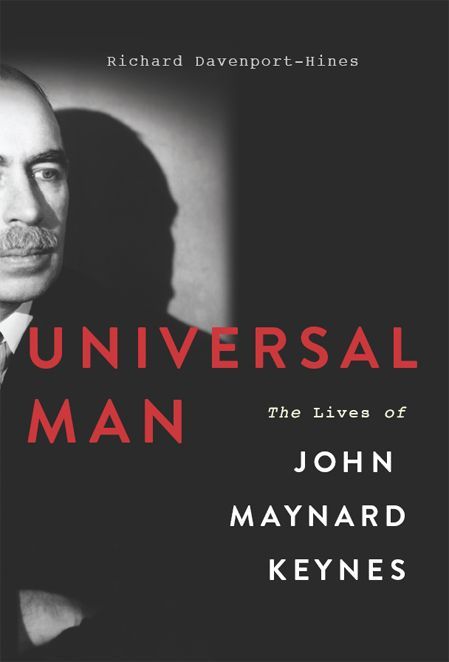
Universal Man
The Lives of John Maynard Keynes
فرمت کتاب
ebook
تاریخ انتشار
2015
نویسنده
Richard Davenport-Hinesناشر
Basic Booksشابک
9780465060665
کتاب های مرتبط
- اطلاعات
- نقد و بررسی
- دیدگاه کاربران
نقد و بررسی

March 9, 2015
With Keynes once again in ascendance thanks to the Great Recession, this gracefully written biography gives lay readers a chance to reacquaint themselves with the man whose theories were behind TARP and quantitative easing. Davenport-Hines (An English Affair) divides the book into seven personality aspects or “snapshots,” capturing Keynes’s complexity but making it more difficult to appreciate him in the whole. Keynes’s economic theories receive particularly short shrift. On the other hand, fascinating personal details emerge, such as Keynes’s abhorrence of bitten fingernails, which for him sullied even such an eminence as the poet W.H. Auden: “All other impressions so favourable, but those horrid fingers cannot lie.” Readers familiar with Keynes’s marriage to a Russian ballerina may be surprised to learn that he originally, and predominantly, favored men, cataloguing his casual pickups on long lists. Indirectly, Davenport-Hines’s focus on Keynes as a human being offers some insight into Keynes as an economist, suggesting that his universality, as well as personal warmth and humanism, informed his belief that both government and the free market had economic roles to play, and that the love of money was, in itself, “a somewhat disgusting morbidity.” This is a delightful, detailed portrait, rich in interesting anecdote and encompassing the entire roster of Keynes’s accomplishments.

March 1, 2015
An unconventional biography of the brilliant economist who shaped British public life in the 20th century.Historian Davenport-Hines (An English Affair: Sex, Class and Power in the Age of Profumo, 2013, etc.) examines the many ways in which John Maynard Keynes (1883-1946) left his mark on the age that bears his name. In the 35 years after World War II, Keynes' economic ideas dominated the policies of Western governments. Yet his celebrated economic theories are little discussed here. Instead, the author traces the many other ways of viewing Keynes' unusually rich life "as an exemplary figure, as a youthful prodigy, as a powerful government official, as an influential public man, as a private sensualist, as a devotee of the arts and as an international statesman." A product of Eton and King's College, Keynes, in his varied undertakings (civil servant, businessman, writer, book collector, and member of the "gifted little clan" called the Bloomsbury Set), "conjoined different networks of expertise, influence and ambitions." Eschewing chronology, Davenport-Hines focuses on the values and forces that animated Keynes in his engagements with so many spheres of life. With his great curiosity and imagination, Keynes sought always to convince people into "right thinking," whether in dining clubs and discussion groups or in encounters with leading figures in politics, banking, and the arts. A homely man (with a "queer swollen eel look," said Virginia Woolf), he was nonetheless highly persuasive, with a beguiling voice that seduced listeners (including many lovers) and a tireless devotion to the belief that only human stupidity and pessimism stood in the way of progress. In all things, he was guided by a concern for how people could lead virtuous and productive lives. The author offers vivid glimpses of Keynes' interactions with such contemporaries as Lytton Strachey, Leonard Woolf, and Vanessa Bell. An admiring and nuanced book filled with insights into this scholar and man of action in all his complexity.

May 1, 2015
Davenport-Hines (An English Affair; Proust at the Majestic) presents John Maynard Keynes (1883-1946) as a many-sided man besides being the most influential economist of the past 100 years. The author eschews technical discussion of economic theories in favor of rounding out Keynes as a whole in seven topical chapters: altruist, boy prodigy, official, public man, lover, connoisseur, envoy. He details Keynes's formative years at Eton College and Cambridge University; early government service; criticism of the Versailles peace treaty; seminal 1936 General Theory of Employment, Interest and Money; involvement in World War II; and his role in shaping the postwar world. The author shows how Keynes developed his persuasive powers through dinners and meetings and how he could pragmatically switch course in response to changing conditions. He fully explores Keynes's years of promiscuous homosexuality, his promotion of the arts, and his membership in the Cambridge Apostles and the Bloomsbury Group. VERDICT This book will suit a broad audience wanting to understand Keynes and the period in which he lived. Readers seeking an accessible introduction to Keynesian economics following the 2008 financial crisis should consider Robert Skidelsky's Keynes: The Return of the Master.--Lawrence Maxted, Gannon Univ. Lib., Erie, PA
Copyright 2015 Library Journal, LLC Used with permission.

April 1, 2015
Historian Davenport-Hines' biography of famed economist John Maynard Keynes (18831946) is framed in seven snapshots of his life: as an exemplary figure . . . youthful prodigy . . . powerful government official . . . influential public man . . . private sensualist . . . devotee of the arts and . . . international statesman. Keynes, the chief intellectual influence on English public life in the twentieth century, devised his economic theories alone and during spirited discussions, and subsequently coaxed politicians and financiers on two continents to implement them. During the Keynesian era, the 35-year period after WWII, his ideas dominated the economic policies of Western governments, which led to the most sustained period of rapid expansion in history. Keynesianism upheld regulated capitalism and involved a commitment to full employment at any cost. Davenport-Hines concludes, If his life has one pre-eminent lesson based . . . on the probabilities for good outcomes, it is that if confronted by conflicting alternatives, when choosing the way forward . . . the sound principle is to take the most generous course. A vital book.(Reprinted with permission of Booklist, copyright 2015, American Library Association.)

























دیدگاه کاربران